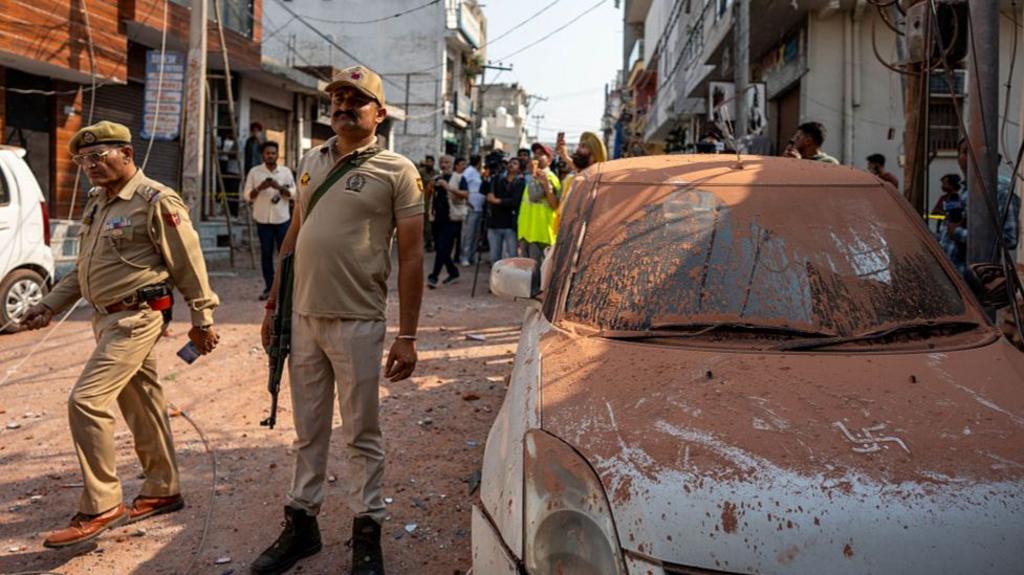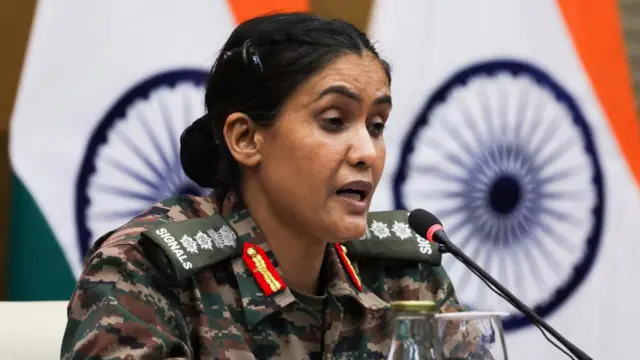Thanks MF for headsup:
BBC:
India and Pakistan agree ceasefire after days of cross-border strike
BBC News

Summary
- India and Pakistan agree to a full and immediate ceasefire - the pause began at 17:00 local time (12:30 BST)
- India is adhering to the agreement, but its army remains "vigilant" and "prepared to launch what is necessary for the defence of our nation", officials say
- Pakistan's deputy PM says it has "always strived for peace and security in the region"
- The ceasefire is the result of "a long night of talks mediated by the United States", Donald Trump says
- The US president is likely going to portray himself as a global peacemaker as all-out conflict has been averted, writes our South Asia editor Anbarasan Ethirajan
- This week, India struck targets in Pakistan and Pakistan-administered Kashmir in response to a deadly militant attack on Indian tourists in Pahalgam last month - Islamabad denies involvement
- Both sides accused each other of cross-border shelling and missile and drone attacks since India launched its military operation - India and Pakistan both claim Kashmir in full

Anbarasan Ethirajan
South Asia regional editor, reporting from Delhi
Once again, an all-out conflict between the two South Asian rivals has been averted - at least for now.
Again, the US seems to have been the key player in brokering a ceasefire.
While India and Pakistan may be going back to their bases to count their losses or gains, President Trump is likely to portray himself as a global peace maker, and his Secretary of State, Marco Rubio, can claim his first major diplomatic success.
The Pakistani military can tell its people how they managed to thwart what they call India's aggression. In a way, they are another winner here as the country rallied behind them.
Just two years ago, there were protests against Pakistan's army by the supporters of the ousted former prime minister Imran Khan.
Well, what India can learn?
India can again argue that it didn't hesitate to strike at what it calls terrorist infrastructure inside Pakistan, despite Pakistan's nuclear deterrence.
Overall, Delhi may also realise that their bitter rival's air power may be more than a match, and they fell short of landing the decisive blow they sought, despite spending billions on new weapons.

South Asia regional editor, reporting from Delhi
Once again, an all-out conflict between the two South Asian rivals has been averted - at least for now.
Again, the US seems to have been the key player in brokering a ceasefire.
While India and Pakistan may be going back to their bases to count their losses or gains, President Trump is likely to portray himself as a global peace maker, and his Secretary of State, Marco Rubio, can claim his first major diplomatic success.
The Pakistani military can tell its people how they managed to thwart what they call India's aggression. In a way, they are another winner here as the country rallied behind them.
Just two years ago, there were protests against Pakistan's army by the supporters of the ousted former prime minister Imran Khan.
Well, what India can learn?
India can again argue that it didn't hesitate to strike at what it calls terrorist infrastructure inside Pakistan, despite Pakistan's nuclear deterrence.
Overall, Delhi may also realise that their bitter rival's air power may be more than a match, and they fell short of landing the decisive blow they sought, despite spending billions on new weapons.

Thomas Mackintosh


Image source, Reuters
Image caption, Colonel Sophia Qureshi speaks during a press briefing in New Delhi, India
After four days of cross-border attacks, India and Pakistan have agreed to stop fighting. Developments have been coming in thick and fast - so let's recap what has happened:
Donald Trump was first to signal a ceasefire, posting on Truth Social that the US had mediated the talks.
Pakistan's Foreign Minister Ishaq Dar confirmed that his country had agreed to the ceasefire. He told Pakistani media that "three dozen countries" were involved in the diplomacy - including Turkey, Saudi Arabia and US Secretary of State Marco Rubio.
Indian Foreign Secretary Vikram Misri then confirmed India had agreed to "stop all firing and military action on land, air and sea". He added in brief news conference that the ceasefire came into effect from 17:00 IST (12.30 BST).
The BBC's South Asia correspondent Samira Hussain reported that India and Pakistan will speak again on Monday.
Indian defence officials then held a news conference in New Delhi. They said they accept the agreement but will remain vigilant to defend India if necessary.
As a result of the announcement, Pakistan has re-opened its airspace to all aircrafts.
Another for you. Sorry a bit lazy to swap between app for the detail, just the weblink...
ReplyDeletehttps://x.com/GhostofBPH/status/1921210080290078939?t=vk9_TqeICFssENSWe6wNTA&s=19
Not surprise if the Orange Hair man used his bully pulpit to badger both sides to peace...that should be ok if that means no further loss of lives or property.
ReplyDelete2025 Nobel Peace Prize Award Committee has taken note. Next Week….Saudi Arabia.
ReplyDeletewakakaka - good observation
DeleteA Donald Fuck "ceasefire" cannot be trusted.
ReplyDelete